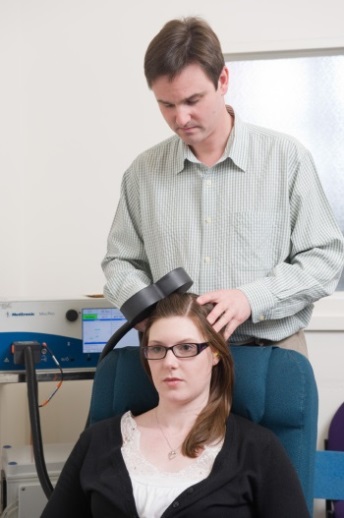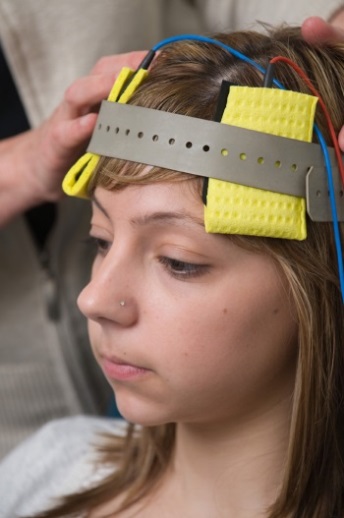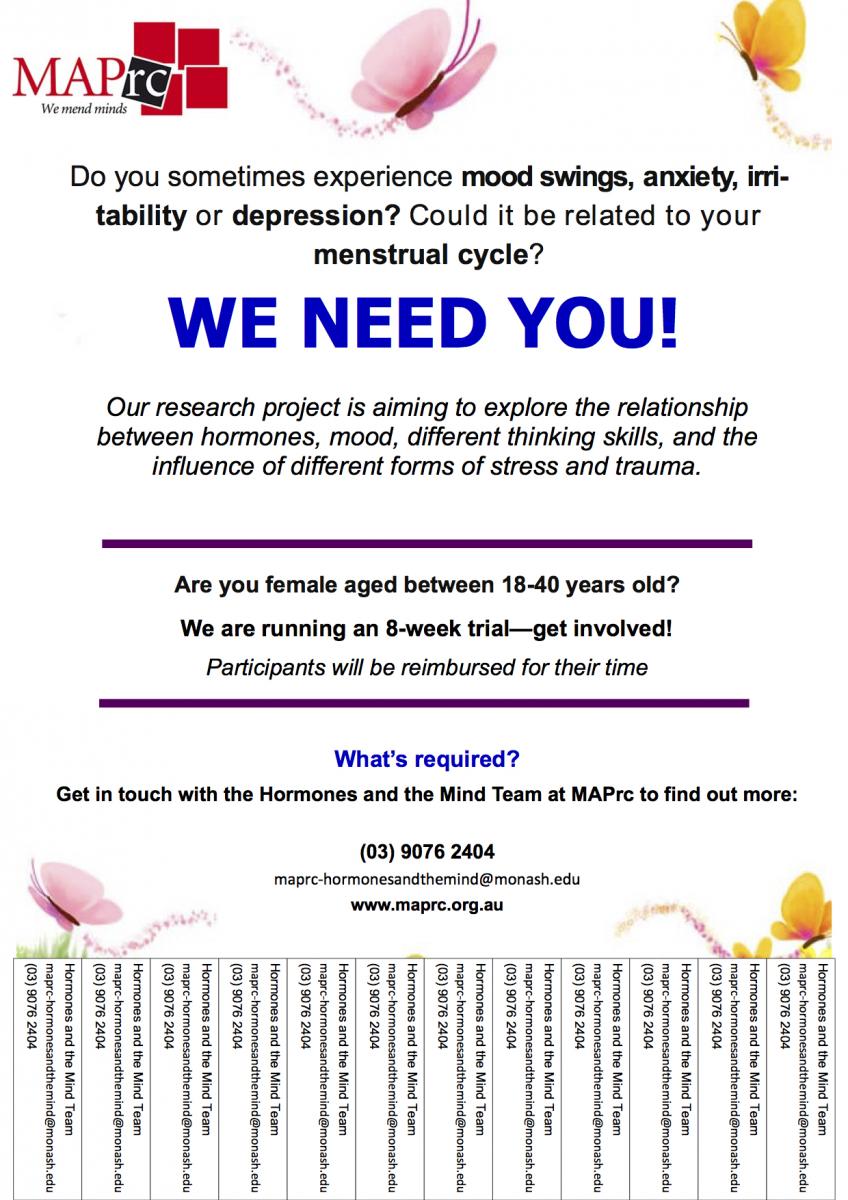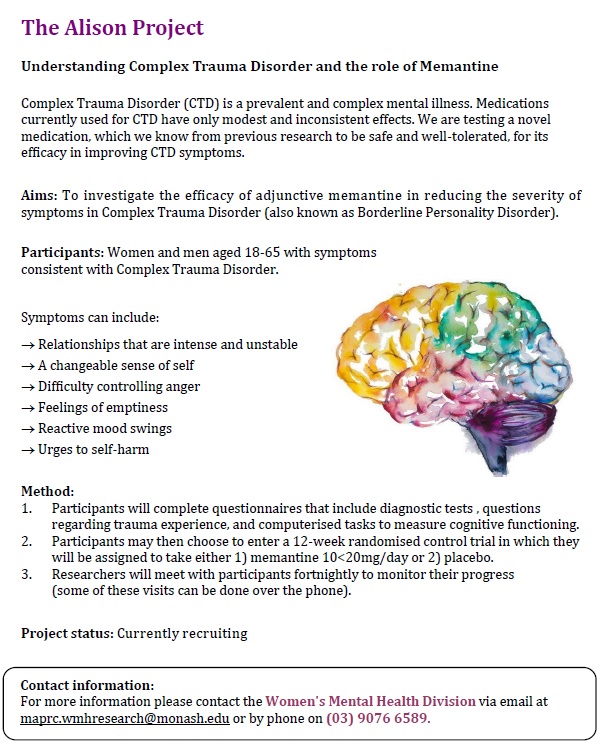Our Research
 Research at MAPrc is extraordinarily diverse. Our projects range from neuroimaging techniques that are recognised around the world for the breakthrough insights they provide into brain structure and function in health and illness, to innovative new treatments to boost the effectiveness of conventional medications for major mental illnesses. Other research streams are grassroots initiatives looking at ways to make the delivery of community mental health service more efficient and addressing the mental health aspects of problem gambling.
Research at MAPrc is extraordinarily diverse. Our projects range from neuroimaging techniques that are recognised around the world for the breakthrough insights they provide into brain structure and function in health and illness, to innovative new treatments to boost the effectiveness of conventional medications for major mental illnesses. Other research streams are grassroots initiatives looking at ways to make the delivery of community mental health service more efficient and addressing the mental health aspects of problem gambling.
Our approach reflects our commitment to ‘bench to bedside’ research. Results translate directly into everyday benefits for people with mental illnesses, carers and healthcare professionals.
All our activities are guided by our mission: to conduct world-class psychiatric research with respect, equality and understanding.
MAPrc research is divided into a number of streams listed below. For further information, please see the menu links on the right.
Research and Treatment Tools
Transcranial magnetic stimulation (TMS)
Transcranial magnetic stimulation (TMS) is a technology which is an effective treatment for 
depression and also showing substantial promise as a therapy for a range of other conditions.
TMS is a non-invasive treatment which works by using a magnetic field to stimulate nerve cells in superficial areas of the brain. A hand-held, plastic-coated coil is placed close to the scalp of the person receiving TMS treatment. An electrical current passes through the coil, creating a magnetic field that stimulates electrical activity in the nerve tissue below the coil.
The effect of the stimulation varies with the frequency and intensity of stimulation and the orientation of the stimulation coil. TMS stimulation has been shown to have effects on mood, motor (control of movement) and cognitive (thinking and planning) functioning.
As well as a therapeutic tool,TMS can be used as a method to investigate brain function.
TMS as a treatment method
Studies have been evaluating the use of TMS in the treatment of patients with depression for over 15 years. At MAPrc we have been at the centre of a worldwide research effort focused on evaluating and more recently improving the use of TMS treatment for patients with depression. We have conducted an extensive series of clinical trials that have contributed to robustly demonstrating that TMS is an effective treatment. We have also conducted extensive research evaluating the use of potentially new and improved forms of TMS treatment.
Because it is a non-invasive therapy that is carried out while the person receiving it is awake and alert, TMS has important advantages over older therapies such as electroconvulsive therapy (ECT). These include: low risk of side-effects or serious complications, avoidance of the need for anaesthesia and its associated risks, lower costs and less inconvenience to the patient, avoidance of the stigma that ECT sometimes carries, and the fact that TMS is suitable for use in medically unwell people who may not be able to tolerate certain medications or ECT.
TMS is now becoming a widely used treatment for depression around the world. There are clinical programs providing TMS treatment globally, including the US, and its place in clinical practice is gradually being refined.
In addition to using TMS in depression, studies are now exploring its use in other disorders including bipolar disorder, autism, Asperger's disorder and substance abuse. We have conducted, and continue to conduct innovative studies like these, including in depression, autism, schizophrenia, fibromyalgia and obsessive compulsive disorder. You can find more information about this research on the Psychiatric Neurotechnology: current projects page
Contact details
Email: tms-trials@monash.edu
Phone: 9076 6596 or 9076 6592
TMS as a probe of brain function
TMS is widely utilised as a technique in studying normal and abnormal brain activity. When TMS pulses are applied to the muscle area of the brain, a muscle response is produced, for example in the hand, which can be measured and characterised accurately. This allows researchers to study the function of the motor control system. When TMS pulses are applied to other brain regions, they can be used to interfere with or temporarily augment other brain activities allowing study of these brain functions.
Researchers have also combined TMS with brain imaging methods such as EEG and NIRS as a method of studying brain function in non-motor brain regions. When EEG is recorded during a TMS pulse, we can measure the brain's electrical response to the TMS pulse, which reflects the normal functioning of the brain being stimulated. In a similar way, the brain's vascular response to stimulation can be measured with NIRS.
Researchers within MAPrc have extensively used TMS-EEG and TMS-NIRS methods to study brain function and the response to TMS in healthy subjects and in a number of illness states including depression, schizophrenia and addiction.
Transcranial direct current stimulation
Transcranial direct current stimulation (tDCS) is a relatively new brain stimulation technique. It uses a very gentle electrical current (1-2 mA) to change the activity level of cells in specific areas of the brain. The low current is not enough to cause brain cell to fires, but it changes the environment around nerve cells in the area of the brain that is stimulated making them more or less likely to fire.
Like TMS, tDCS is a non-invasive technique which does not require any anaesthetic and has minimal side-effects. It also has potential use as a way of investigating brain function but is mostly being explored in the possible treatment of conditions such as chronic pain, epilepsy, stroke, Parkinson's disease and depression. Currently, it is being investigated as a treatment for depression in people whose symptoms have not been resolved with medication (treatment-resistant depression).
Over recent years, researchers within MAPrc have conducted a careful series of studies demonstrating that tDCS has the potential to modulate and improve aspects of brain cognition, including learning and memory. These studies are ongoing and hopefully will lead to the development of tDCS methods as treatments for disorders with cognitive dysfunction such as schizophrenia, head injury and Alzheimer's disease. You can find more information about this research on our current Treatment Studies and Investigative Studies.
Service Related Research

Service Related Research focuses on the day-to-day problems managed by government funded mental health services. The great majority of this research is currently undertaken in collaboration with the Alfred Hospital Department of Psychiatry.
Such research includes, but is not limited to: observational studies designed to better characterise and describe a particular issue; evaluation studies designed to measure current practice against clinical and/or financial benchmarks; and interventional studies, trialling novel approaches in diagnosis and/or treatment.
The key focus of Service Related Research at APRC is on the ‘real world’ problems confronted by service managers in public mental health services and by clinicians working at the coal-face.
Service Related Research team
Dr Leo Chen
Coordinator
Service Related Research: current projects
1. Understanding interpersonal hostile-dominance and its role in aggressive behaviour in psychiatry inpatients
This project is being undertaken by MAPrc in collaboration with the Centre for Forensic Behavioural Science, Monash University. The study is being conducted at the Alfred Hospital.
Aggressive behaviour by patients admitted to psychiatric hospitals occurs frequently and causes problems for patients and staff. Considerable research has explored the various factors that appear to contribute to aggression in psychiatric hospitals. Historically, this research has focussed on the clinical characteristics of aggressive patients, although environmental factors and interactional aspects of aggression have recently been emphasised.
There is some evidence to suggest that interpersonal style, which refers to the characteristic ways in which a person manages their relationships with others and is a significant feature of personality, and levels of perceived coercion, may have an effect on the risk of violent and aggressive behaviour during hospitalisation.
The project aims to:
* to explore the relationship over time between interpersonal style, psychiatric symptoms and aggression in hospitalised psychiatric inpatients,
* to delineate the psychological characteristics of patients with a hostile-dominant interpersonal style,
* to examine whether a history of early childhood abuse predicts hostile-dominance.
Participants
A total of 200 adult acute psychiatric patients have been recruited from the inpatient unit at the Alfred Hospital.
Methods
Anyone newly admitted to the acute inpatient psychiatry services at The Alfred over a specific period were eligible for inclusion. Participants who consented to take part in the study were asked to spend approximately 60 minutes with a research assistant to discuss their experience of being admitted to hospital. This step involved completion of the Impact Message Inventory-Circumplex, Positive and Negative Syndrome Scale, Life History of Aggression Questionnaire, State-Trait Anger Expression Inventory and the Childhood Trauma Questionnaire. Participants were also asked to give permission for the research assistant to have access to their Alfred Psychiatry file to check for incidents of aggression and behaviours during their admissions.
Project status
Data collection has completed and publications detailing project findings are currently being prepared.
Researchers
Dr Michael Daffern
Dr Yitzchak Hollander
Tegan Podubinski
Dr Stuart Lee
2. The impact of psychosocial factors on psychological distress, quality of life and survival of patients undergoing haematopoietic stem cell transplantation
This project is being undertaken by MAPrc in collaboration with the Cabrini Monash Psycho-oncology Unit and staff from Alfred Health. The study is being conducted at the Alfred Hospital.
Stem cell transplantation is often the last course of treatment for patients with haematological cancer who have experienced a relapse or previously unsuccessful treatment attempts. It is often experienced as a very difficult treatment with a number of physical side effects, and many patients experiencing this treatment have been found to experience high levels of psychological distress that impacts on quality of life and capacity to follow treatment recommendations.
While much is known about the physical and medical predictors of treatment success, less is known about the level of distress and when distress is experienced, as well as how social, medical and other coping approaches help or worsen the experience of distress over time. One particular dispositional factor that is being explored in this study is Sense of Coherence which captures the extent to which people view a difficult situation as comprehensible, manageable and meaningful.
The project aims to:
* to examine the level of emotional distress and quality of life of patients immediately before HSCT, 2-3 weeks post-transplant and 3 months post-transplant,
* to determine if clinical risk factors, demographic factors and Sense of Coherence predicts psychosocial distress in patients undergoing HSCT,
* to determine retrospectively whether various demographic factors, clinical indicators, coping styles and psychological distress experienced pre-transplant predicted survival at 12 months post-transplant.
Participants
Two separate studies have been conducted. Study 1 collected data from the hospital files of 122 people who underwent a stem cell transplant at The Alfred hospital between 20052011. Study 2 which began in 2012, directly collected information from 60 people directly who were about to undergo a stem cell transplant at The Alfred hospital as a treatment for a haematological cancer.
Methods
For Study 1, measures completed with patients as part of the pre-transplant preparation were collected assessing aspects of cancer coping response, quality of life, and distress. For Study 2, participants were invited to complete a set of questionnaires at three timepoints: immediately prior to the transplant, 2-3 weeks after the transplant (while usually still in hospital) and at 3 months after the transplant. Included measures assessed distress, sense of coherence, quality of life and severity of trauma symptoms related to the transplant experience.
Project status
Data collection has completed for both studies and publications are currently being prepared.
Researchers
Dr Stuart Lee
Brindha Pillay
Lynda Katona
Sue De Bono
Dr Sue Burney
Dr Sharon Avery
3. Piloting the effectiveness of physical health nurses in community based mental health services
This project is being undertaken by MAPrc in collaboration with the Alfred Psychiatry and Inner South Community Health Service.
Previous research has shown that in comparison to people in the general population, people with a severe mental illness die on average 25 years earlier. A particular reason for this is that people with a severe mental illness have higher rates of cardiovascular disease, metabolic disorders, obesity and hypertension, and reduced engagement with health services.
A pilot study has been implemented within a community team of Alfred Psychiatry and Inner South Community Health Service, which was compared to usual care, to appoint a physical health nurse to lead members of their clinical team in monitoring and establishing plans to address identified physical health difficulties for their clients.
The project aims to:
* Measure whether a physical health intervention led by a physical health nurse for case managed community mental health consumers produces greater improvements in physical health indicators compared to treatment as usual.
* Explore how staff encountering the physical health nurse and receiving provided training about physical illness in people with a severe mental illness, experienced these initiatives.
Participants
People who are case managed by Alfred Psychiatry and Inner South Community Health Service and have a Client Physical Health Guide completed with their case manager are eligible to participate in this study.
Methods
Participants who are case managed by a clinician who has access to a physical health nurse will be compared with participants whose case manager does not have access to the physical health nurse. Their scores on the Client Physical Health Guide will be compared between the initial assessment and 6 month follow-up to determine whether there has been a greater improvement in health indicators with the intervention condition. Case managers employed by both services will also be invited to complete a questionnaire to explore their experience of the initiative.
Project status
Baseline completion of Client Physical Health Guides has completed and follow-up assessment will shortly commence. The staff experience questionnaire is also currently being finalised.
Researchers
Dr Stuart Lee
Troy Macris
Susanne Birks
Kent Burgess
Jessica Price
Narelle Heeney
Lee Kelleher
David Pritchard
Psychopharmacology
|
Unit Director
|
Principal Investigators Dr Leonard Chen Professor Jayashri Kulkarni |
Clinical Trial Coordinators Navneet Legha Dr Eveline Mu |
|
Sub Investigators Dr Lauren Dawes |
Clinical Researchers Dr Caroline Gurvich |
|
|
Manager Emmy Gavrilidis |
Ethics / Quality Assurance Emmy Gavrilidis |
|
Current Projects:
Title: A phase II randomized, double-blinded, placebo-controlled parallel group trial to examine the efficacy and safety of BI 425809 once daily with adjunctive Computerized Cognitive Training over 12 week treatment period in patients with schizophrenia
Principal Investigator: Dr Leonard Chen
Sub Investigators: Prof Jayashri Kulkarni, Dr Lauren Dawes, Anthony de Castella
Study Staff:
Yasmin Malik and Marta Malicka, Emma Dumigan, Emmy Gavrilidis, Emma Cholakians, Kathleen de Boer
Sponsor: Boehringer Ingelheim Pty Ltd
Brief description: Intact cognition is essential for everyday living. Cognitive impairment is a core feature of schizophrenia. In fact, CIAS has been shown to be a major determinant of poor functional outcome. Thus, treatment of CIAS is a high unmet medical need. Neuroplasticity, which refers to the brain’s ability to acquire and store new information, is activity dependent and responds to environmental demands. Environmental cognitive stimulation conducive to learning is often absent in the lives of patients with schizophrenia. It was hypothesized that efficacy of compounds targeting cognition in patients with schizophrenia may be augmented by providing environmental cognitive stimulatio. Cognitive training employing exercises engaging specific cognitive domains is an optimal tool to provide environmental cognitive stimulation, with more standardized delivery than various in-person psychosocial training. Moreover, cognitive training can be administered outside of the clinic/hospital in a computerized form known as CCT. This training can also be monitored remotely by clinicians to ensure adherence to the training. As a strategy to enhance neuroplasticity and thereby optimize performance of compromised cognitive function in patients with schizophrenia, this study will employ CCT as an enrichment strategy adjunctive to the 12-week treatment with BI 425809. The study is designed to show superiority of BI 425809 over placebo in patients on a background of CCT.
Title: A Phase II, 6-week, multicenter, randomized, double-blind, double-dummy, placebo-controlled, parallel group trial with a quetiapine arm to evaluate the efficacy, tolerability and safety of oral BI 1358894 in patients with Major Depressive Disorder with inadequate response to antidepressants.
Principal Investigator: Dr Leonard Chen
Sub Investigators: Prof Jayashri Kulkarni, Dr Lauren Dawes, Anthony de Castella
Study Staff:
Navneet Legha, Marta Malicka, Emmy Gavrilidis, Emma Dumigan, Emma Cholakians, Kathleen de Boer
Sponsor: Boehringer Ingelheim Pty Ltd
Brief description: Despite the array of available treatment options, there remains significant unmet medical need in patients who either do not respond to or do not tolerate current augmentation approaches (e.g., atypical antipsychotics, lithium) or in cases where these are either not available or unsuitable. A product that would show similar efficacy to the above mentioned augmentation treatments, but without the side effects (e.g., weight gain, akathisia, somnolence, abuse potential), would constitute a major medical advance. Based on the pre-clinical data and the data from our proof of clinical principles (PoCP), there is reason to believe that BI 1358894 may be efficacious in treatment of MDD. The underlying hypothesis of the therapeutic concept is that emotion dysregulation is a core symptom of MDD and that a reduction of that symptom will lead to a decrease of the symptom burden related to the depressive symptomatology, including negative valence, anxiety and rumination. If that is achieved, such a treatment approach will lead to a significant improvement in disease burden and an improvement in overall functioning. To address future scientific questions, participants will be asked in this trial to voluntarily donate biospecimens for banking (please see section 5.5). If the participant agrees, banked samples may be used for future biomarker research and drug development projects, e.g. to identify participants that are more likely to benefit from a treatment or less likely to experience an adverse event, or to gain a mechanistic or genetic understanding of drug effects and thereby better match patients with therapies.
Title: A phase II randomized, double-blinded, placebo-controlled parallel group trial to examine the efficacy and safety of 4 oral doses of BI 1358894 once daily over 12-week treatment period in patients with borderline personality disorder.
Principal Investigator: Dr Leonard Chen
Sub Investigators: Prof Jayashri Kulkarni, Dr lauren Dawes, Anthony de Castella
Study Staff:
Dr Eveline Mu, Marta Malicka, Emmy Gavrilidis, Emma Dumigan, Emma Cholakians, Kathleen de Boer
Sponsor: Boehringer Ingelheim Pty Ltd
Brief description: This study is designed to provide the proof of concept (PoC) for TRPC4/5 inhibition by BI 1358894 in patients with BoPD and provide data for further development of BI 1358894. There are no qualified biomarkers for BoPD that could be taken as surrogate endpoints or that would be strongly indicative of therapeutic effect. Hence, the PoC can only be achieved in a large, sufficiently powered phase II study to address suitable dose(s), safety and efficacy of BI 1358894, which is the main rationale for this study. Additionally, exploratory biomarkers will be assessed by means of task-based functional magnetic resonance imaging (MRI) measurements (emotional paradigms) for circuit engagement of brain structures involved in emotional processing. These biomarkers of brain physiology may help interpretation of the data, may support the therapeutic concept, or may help identify subgroup of patients that are better responders. The task-based functional MRI sub-study is described in detail in section 10.2. The MRI sub-study will be done at few sites and participation in the sub-study will be optional. In order to be able to address future scientific questions, patients will be asked to voluntarily donate biospecimens for banking (please see section 5.4). If the patient agrees, banked samples may be used for future biomarker research and drug development projects, e.g. to identify patients that are more likely to benefit from a treatment or experience an AE, or to gain a mechanistic or genetic understanding of drug effects and thereby better match patients with therapies.
HER Centre Australia

HER Centre Australia, established as a formal Monash University Centre in 2022 stands for Health, Education, and Research in Women's Mental Health. For more information about HER Centre Australia, visit the HER Centre Australia website - www.monash.edu/her-centre
Mental illness has many gender-specific aspects that clinical research has not always addressed. For example, in conditions such as schizophrenia, the age of onset and pattern of symptoms commonly seen is different for women and men. Women and men may also respond differently to medications or other treatments. In addition, changes in the level of sex hormones such as estrogen are known to affect symptoms.
The HER Centre Australia team is working on numerous aspects of women’s mental health, the experiences of women with mental illness and potential options for treatment.
One particular focus of our research is the role of the neuroendocrine system in mental illnesses, and specifically the use of female hormones to improve the results of treatment. We are conducting ground-breaking research into the use of estrogen to improve symptoms in schizophrenia and the use of selective brain estrogens in postmenopausal women. We are also exploring possible links between the oral contraceptive pill and depression.
To find out more about current projects click here. For information about our PTSD clinical trial, please click here
HER Centre Australia Team Members
Professor Jayashri Kulkarni
Research Manager
Anthony de Castella
Emmy Gavrilidis
NH&MRC Early Career Research Fellow
HER Centre Australia: Current Projects
The HER Centre Australia team coordinates a number of treatment and intervention trials focused on the gender differences in psychiatric care.

|
CURRENTLY RECRUITING STUDIES IN WMH |
|
|
Double-Blind Randomised Investigation of Bazedoxifene and conjugated estrogen for Depression in Menopausal Women.Double-Blind Randomised Investigation of Bazedoxifene and conjugated estrogen for Depression in Menopausal Women. |
|
|
The Alison Project: A randomised double-blind placebo controlled investigation of adjunctive memantine in the treatment of symptoms of complex trauma disorder (also known as borderline personality disorder) |
|
|
Estradiol as a Treatment for Women with Borderline Personality Disorder |
|
|
Bazedoxifene – A New Selective Estrogen Receptor Modulator Treatment for Women with Schizophrenia |
|
|
The Damian Project – The Use Bazedoxifene as a Potential Treatment for Men with Schizophrenia |
|
|
Genital Self-Image and Body Image Concerns |
|
|
|
|
To participate in a MAPrc Clinical Trial - Click here to email your interest
Double Blind Randomised Investigation of Tibalone as an Adjunct to Standard Antidepressant Treatment for Relapsed and Persistent Depression in Peri- and Post-Menopausal Women
Hormones and the Mind

We would like to thank First Response for their sponsorship for part of this study.

The Alison Project: A randomised double-blind placebo controlled investigation of adjunctive memantine in the treatment of symptoms of complex trauma disorder (also known as borderline personality disorder)

Estradiol as a Treatment for Women with Borderline Personality Disorder
Estradiol as a Treatment for Women with Borderline Personality Disorder
Background:
Borderline Personality Disorder (BPD) is a serious and highly prevalent (5.9%) psychiatric disorder, affecting women more than men. BPD sufferers experience severe emotional instability, social and occupational dysfunction, and engage in chronic self-mutilation and suicidal behaviours, with associated high levels of mortality, morbidity, and health service use. BPD patients are a complex group that are challenging to treat. Current psychological treatments are expensive and difficult for BPD patients to access, and there is currently no clearly designated pharmacotherapy. Underpinned by psychosocial causes, childhood trauma is reported in most patients (>80%) and is linked to abnormalities in the development of the neuroendocrine axes. Significantly, cyclical fluctuations in ovarian hormones affect emotional and cognitive behaviours relevant to BPD. As such, this indicates the neuroendocrine system as a potential therapeutic target for the treatment of BPD symptoms.
Aim:
To determine whether estradiol is effective in treating symptoms of BPD, and specific symptom domains including emotional regulation, cognition, mood and quality of life, as well as biological markers.
Participants:
Women aged between 18-43, who have a current diagnosis of BPD or experience symptoms consistent with BPD are invited to take part in this study.
Methods:
This study is a 12-week randomised, double-blind, placebo controlled trial that will be conducted at the Monash Alfred Psychiatry research centre. Participants will be randomly selected to receive daily either 1) transdermal estradiol 100mcg twice weekly patch, or 2) inactive placebo. Participants will touch base with their study coordinators every two weeks to monitor mood symptoms and adverse events.
Project status
If you are interested in learning more about this study please contact the team to register an expression of interest
For more information, please contact the Women’s Mental Health Division via email at maprc.wmhresearch@monash.edu
Bazedoxifene – A New Selective Estrogen Receptor Modulator Treatment for Women with Schizophrenia
Bazedoxifene – A New Selective Estrogen Receptor Modulator Treatment for Women with Schizophrenia
Background:
Although more commonly associated with women, estrogen is also a naturally occurring hormone in the bodies of men, and is already used clinically to reverse bone loss, enhance cardiovascular function, and treat prostate cancer. However, increasing evidence points to the protective role of estrogen in the brain, and for its positive effects on the symptoms of schizophrenia and schizoaffective disorder. However, adverse effects on breast and uterine tissue in females limit therapeutic use of estrogen in this population.
Bazedoxifene is a new hormone treatment that belongs to a group of medications called Selective Estrogen Receptor Modulators (SERMs). Bazedoxifene is thought to have positive estrogenic effects in the brain without affecting peripheral body tissues, thus offering a longer term treatment approach with potential mental health and cognitive benefits.
Aim:
To compare the efficacy of adjunctive bazedoxifene against adjunctive placebo in treating psychosis symptoms and improving cognition in women with schizophrenia.
Participants:
Women aged between 18-65, who have been diagnosed with schizophrenia and schizoaffective disorder, and are not currently using any hormonal therapy are invited to take part in this study.
Methods:
This study is a 12-week randomised, double-blind, placebo controlled trial that will be conducted at two sites in Melbourne - the lead site is the Monash Alfred Psychiatry research centre and a second site is the Monash Medical Centre. Participants will be randomly selected to receive daily either 1) 40mg bazedoxifene, or 2) inactive placebo. Participants will touch base with their study coordinators every two weeks to monitor psychotic and mood symptoms, and blood samples will be collected at three time-points during the study. The occurrence of any unwanted side effects will also be monitored.
Project status
If you are interested in learning more about this study please contact the team to register an expression of interest
For more information, please contact the Women’s Mental Health Division via email at maprc.wmhresearch@monash.edu
Genital Self-Image and Body Image Concerns
Genital Self-Image and Body Image Concerns
Over the last 10 to 15 years, we have seen a rapid increase in the number of adolescent and adult women requesting cosmetic genital surgery. Professional medical organisations throughout the Western world have expressed serious concerns about this trend. As the American College of Obstetricians and Gynaecologists state, cosmetic genital surgery is not medically indicated, and long term safety and effectiveness data are lacking. Potential complications include infection, altered sensation, dyspareunia, adhesions, and scarring.
Research has shown the primary motivation for these surgeries is aesthetic concern. Our research has focused on investigating the psychological and sociocultural factors underpinning this increase in genital appearance dissatisfaction in women. We firstly examined these factors in adult women, but have subsequently shifted our attention to adolescent girls as this is usually the period when girls first start to develop these concerns. We are also in the process of pilot testing a therapeutic mobile app, based on cognitive behavioural therapy principles, which aims to alleviate women’s genital appearance concerns. We hope that this app will provide an alternative to unproven cosmetic genital surgery and potentially be disseminated nationally and internationally.
For more information, please contact Dr Gemma Sharp via email at gemma.sharp@monash.edu or by phone on (03) 9076 5167
The Damian Project - Bazadoxefine Treatment for Male Schizophrenia
The Damian Project - The Use of Bazadoxifene as a Potential Treatment for Men with Schizophrenia
Thanks to the generous support of the Mohr family, and in honour of the memory of Damian Mohr, MAPrc is privileged to be able to conduct this exiciting new trial to explore the use of Bazadoxifene, a Selective Estrogen Receptor Modulator (SERM), as a potential treatment for men with Schizophrenia.
Study Aim
To study the effect of adjunctive Bazedoxifene – a selective estrogen receptor modulator (SERM) in a double blind, placebo-controlled adjunctive study in the treatment of men with schizophrenia. All patients receive standardized antipsychotic medication.
Trial Background
Despite advances in the treatment of schizophrenia, pharmacotherapy remains sub-optimal, and the prognosis for many patients is poor. We have pioneered work showing that estradiol has a positive role in the treatment of psychosis symptoms and cognitive deficits seen in people with schizophrenia. However, with the longer-term work from studies such as the Women’s Health Initiative (1), it has become clear that long-term use of estradiol with progesterone may have associated increased risks of breast and other cancers. Hence, we began working with the Selective Estrogen Receptor Modulator – raloxifene, which appears to be safer for longer term use with respect to the development of breast and other cancers. Building on our and others work, raloxifene used as an adjunctive treatment in schizophrenia appears to produce inconsistent and varying responses in different sub-populations; gender, menopausal status, age, drug dose and delivery mode. We now propose to conduct a double-blind, randomized, placebo-controlled trial of a third generation SERM – Bazedoxifene – which is 4 times more selective for the alpha than the beta oestrogen receptor subtype. Bazedoxifene appears to be safer with respect to long term use than older SERMs, has additional actions on the glucocorticoid receptor, and together this different pharmacology speculatively has greater potential than other SERMs to impact favorably on both psychosis symptoms and cognition in men and women with schizophrenia. This study will test 100 men to determine if Bazedoxifene, as an adjunctive hormone modulator, is effective for positive and cognitive symptoms of schizophrenia.
Trial Design
The trial will follow the parallel comparison design consisting of two arms over 12 weeks (treatment x time). Participants will be randomized to:
1. Bazedoxifene 40mg oral / day
2. Oral placebo (an inert substance with no active ingredients)
Trial Subjects
100 males with a current diagnosis of Schizophrenia, Schizoaffective and Schizophreniform disorder according to the Diagnostic and Statistical Manual (DSM-5) of the American Psychiatric Association.
This trial has Ethics Committee approval from the Alfred Research and Ethics Committee and the Monash University Human Research Ethics Committee and is currently recruiting
To Participate in this Trial or to find out more please email our team at: participate.maprc@monash.edu or call us on +61 3 9076 6564
Download a Trial Flyer HERE

Eating Disorder Research
Eating Disorders Research

More than 43% of Australians are highly concerned about their body image. Negative body image affects people of all ages, genders and backgrounds, and can lead to risky behaviours such as extreme dieting, excessive exercise, and the pursuit of cosmetic surgery. Negative body image is the strongest risk factor for the development of eating disorders, the most deadly of all mental health conditions.
"Understanding the link between biological, psychological and social factors
to discover better treatments for eating disorders such as anorexia nervosa"
Over one million Australians have an eating disorder. Eating disorders are highly prevalent and have a high morbidity and mortality. The onset and severity of anorexia nervosa and bulimia can be influenced by a number of factors, including a lived experience of trauma.
The existence of effective treatment options for eating disorders is limited. We are implementing a suite of research focussed on understanding the underlying biological causes and changes associated with these disorders so we can translate the findings into innovative and effective treatments. Trials include the use of antipsychotics medications, cannabinoid products, hormone treatment and brain stimulation devices. These trials are currently under development and funding is being sought to support their conduct.
Affiliated Research
MAPrc has participated in a number of affiliated research programs. For further information, please see the menu on the right.
Medicine of the Mind

The Medicine of the Mind team is responsible for teaching psychiatry, psychology and psychological medicine. Its mission is ‘to deliver a seamless education in psychiatry and related disciplines across the breadth of the undergraduate medical course’.
Specifically, this involves: teaching into the Years 1 and 2 of the MBBS course via the Human Lifespan Development and Health and Human Behaviour subjects as well as a Year 1 elective; directing students’ clinical placement for Psychiatry during Year 4; and a Year 5 selective subject. Medicine of the Mind also teaches students in the Radiography, Dietetics and Medical Science courses.
Over the past twelve months, Medicine of the Mind has remodelled several aspects of its teaching in the undergraduate medical course in Years 1, 4 and 5, as well as in Year 1 of the Radiography course.
 The review and remodelling process aims to achieve several things: to research new and vibrant models for teaching psychiatry; to encourage, recruit and reward vibrant teachers; to use staff and materials more efficiently; and to smooth the process by which students acquire the psychology and psychiatry knowledge they will need to be doctors.
The review and remodelling process aims to achieve several things: to research new and vibrant models for teaching psychiatry; to encourage, recruit and reward vibrant teachers; to use staff and materials more efficiently; and to smooth the process by which students acquire the psychology and psychiatry knowledge they will need to be doctors.
Coordinating all teaching through one office helps eliminate duplication and gaps in teaching, ensures consistency in content and facilitates sharing of resources such as staff, materials, ideas, research, forums and simulations.
Students see the same tutors across the years, which provides them with a consistent reference person and fosters development of personal relationships, mentoring and modelling of professional development. Medicine of the Mind also involves psychiatry registrars in its teaching program to foster peer learning.
Medicine of the Mind team
Director, Undergraduate Medical Education
Prof Rob Selzer
Deputy Director
Dr Revi Nair
Administration
Anne Crawford
Innovations
Medicine of the Mind has introduced a number of innovations and continues to identify opportunities to improve students’ learning experience.
Teaching
1. Clinical placement
In response to students’ feedback, the Year 4 clinical placement has been changed from a split 18-week semester alternating psychiatry and general practice to a continuous 9-week program that emphasises clinically based learning and teaching. Students are embedded in a team and expected to play an active role. All clinical staff and students are provided with clear guidelines about the students’ roles and responsibilities.
2. PEERLS
Instead of traditional case-study-based workshops, PEERLS (Professionalism, Ethics, Evidence-base, Roles, Legal, Systemic) has been developed to help students integrate clinical experiences with theory. PEERLS sessions are patient-based, but held away from the bedside. They are led by a clinician /expert, and involve the tutor sharing his/her knowledge and experience.
3. Resources
So far, Medicine of the Mind has produced a book for students that provides an introductory overview to psychiatry and also a video journal.
Technology
Medicine of the Mind seeks to make maximum use of technology to improve teaching and maximise opportunities for students.
1. Web-based video instructions for PEERLS tutors
These provide an easily accessible guide for PEERLS session tutors.
2. COAT – Computerised OSCE Assessment Tool
This system simplifies and speeds up the process of collecting and posting results of students’ practical OSCE (Observed Structured Clinical Evaluation) exams.
3. TICLE – Texting to Improve the Clinical Learning Experience
By making better use of text messaging, students can be advised of last-minute schedule changes, interesting clinical cases and events. This helps avoid delays, bottlenecks and missed learning opportunities.
4. Exam database
A database of past questions by topic, difficulty, etc facilitates the preparation of examinations.
Participate in a Research Study
MAPrc researchers regularly seek people who have experience with mental illness, as well as those who do not, for participation in research projects and treatment trials.
See our Treatment Trials page for information about current projects requiring research. We are also always in need of healthy volunteers to act as 'control' participants. For more information see the MAPrc recruitment drive flyer below.
What is involved in participation will depend on what the research project is, but may include:
- visiting MAPrc at our research centre based on Level 4, 607 St Kilda Road, Melbourne
- having a researcher visit at hospital or at home
- completing questionnaires or participating in interviews by phone or face-to-face
- researchers speaking with doctors or case managers
- trying a new treatment, either instead of, or in addition to, current treatment. Treatments might be:
- brain stimulation
- medication
- hormone treatments
- psychological therapies such as cognitive behavioural therapy (CBT).
Any personal information provided and the record of participation are treated as private health information and kept confidential.
All MAPrc studies have been approved, and are governed by, the Alfred Hospital Ethics Committee.
If you would like to forward a general expression of interest in participating in any of our research projects, please contact our centre on:
Phone: +61 3 9076 6564
Fax: +61 3 9076 6588
E-mail: maprc@monash.edu

